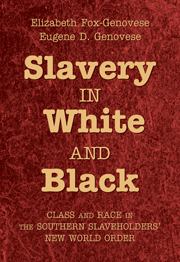Book contents
- Frontmatter
- Contents
- Preface
- Manuscript Collections Cited
- List of Abbreviations
- Slavery in White and Black
- Introduction
- 1 The Impending Collapse of Capitalism
- 2 Hewers of Wood, Drawers of Water
- 3 Travelers to the South, Southerners Abroad
- 4 The Squaring of Circles
- 5 The Appeal to Social Theory
- 6 Perceptions and Realities
- Afterword
- Index
5 - The Appeal to Social Theory
Published online by Cambridge University Press: 05 June 2012
- Frontmatter
- Contents
- Preface
- Manuscript Collections Cited
- List of Abbreviations
- Slavery in White and Black
- Introduction
- 1 The Impending Collapse of Capitalism
- 2 Hewers of Wood, Drawers of Water
- 3 Travelers to the South, Southerners Abroad
- 4 The Squaring of Circles
- 5 The Appeal to Social Theory
- 6 Perceptions and Realities
- Afterword
- Index
Summary
The cry about Emancipation, so well pleased with itself on Humanity Platforms, is but the keynote of that huge anarchic roar, now rising from all nations, for good reasons too – which tends to abolish all mastership and obedience whatsoever in this world, and to render society impossible among the sons of Adam!
—Thomas CarlyleBy the 1850s an emerging southern social theory – newly dubbed “sociology” – defended slavery on higher ground than political economy allowed for. The new social theorists included the eminent scientist Joseph Le Conte as well as theologians, moral philosophers, and political theorists. Their work exposed the ultimate irreconcilability of political economy with a social philosophy appropriate to slaveholding society. Slavery reappeared again and again as the foundation of a society incompatible with the transatlantic world that political economists qua political economists interpreted and extolled.
Socialism
Proslavery theorists had to combat the widespread assumption that the fledgling discipline of sociology preached socialism. Throughout the South applause for socialism's exposure of the ills of free-labor society accompanied dread of socialist movements. Southern clergymen and laymen condemned socialism's principal philosophical, psychological, and economic premises but drew heavily on its critique of the free-labor system, which by the 1850s was beginning to be called “capitalism.” They also drew on radicals like William Godwin and Tories like Samuel Johnson to warn against the moral and physical dangers created by industrialization and the heavy concentration of population.
- Type
- Chapter
- Information
- Slavery in White and BlackClass and Race in the Southern Slaveholders' New World Order, pp. 196 - 233Publisher: Cambridge University PressPrint publication year: 2008



